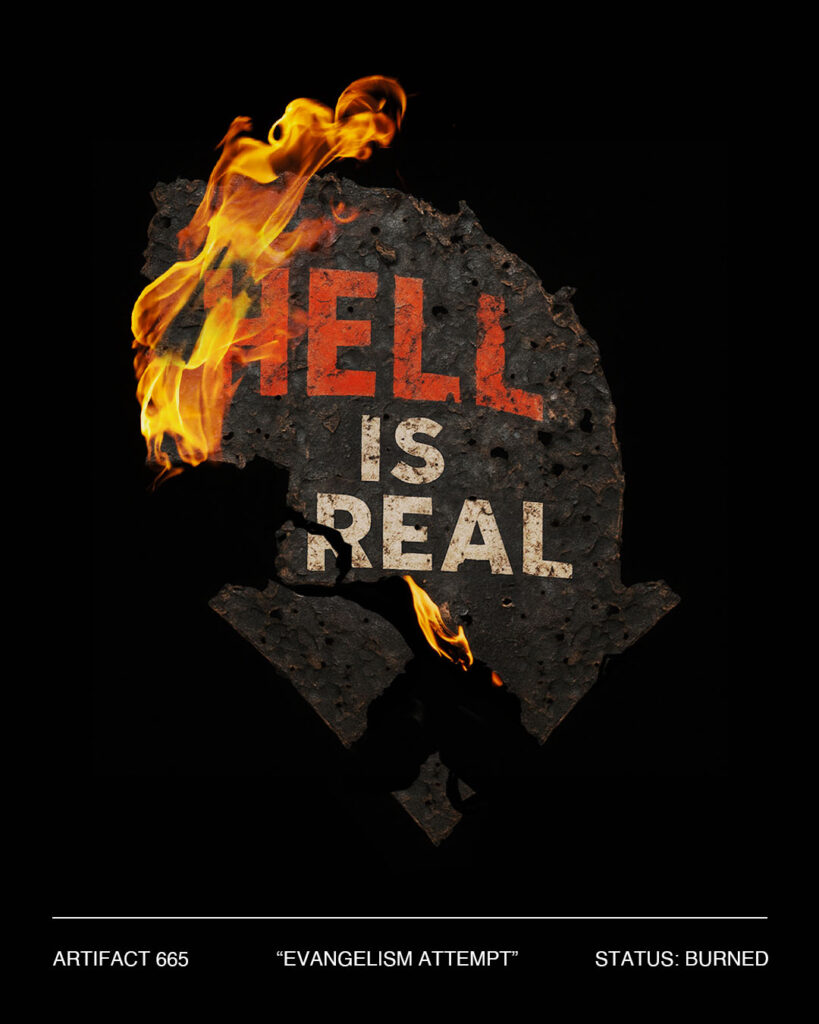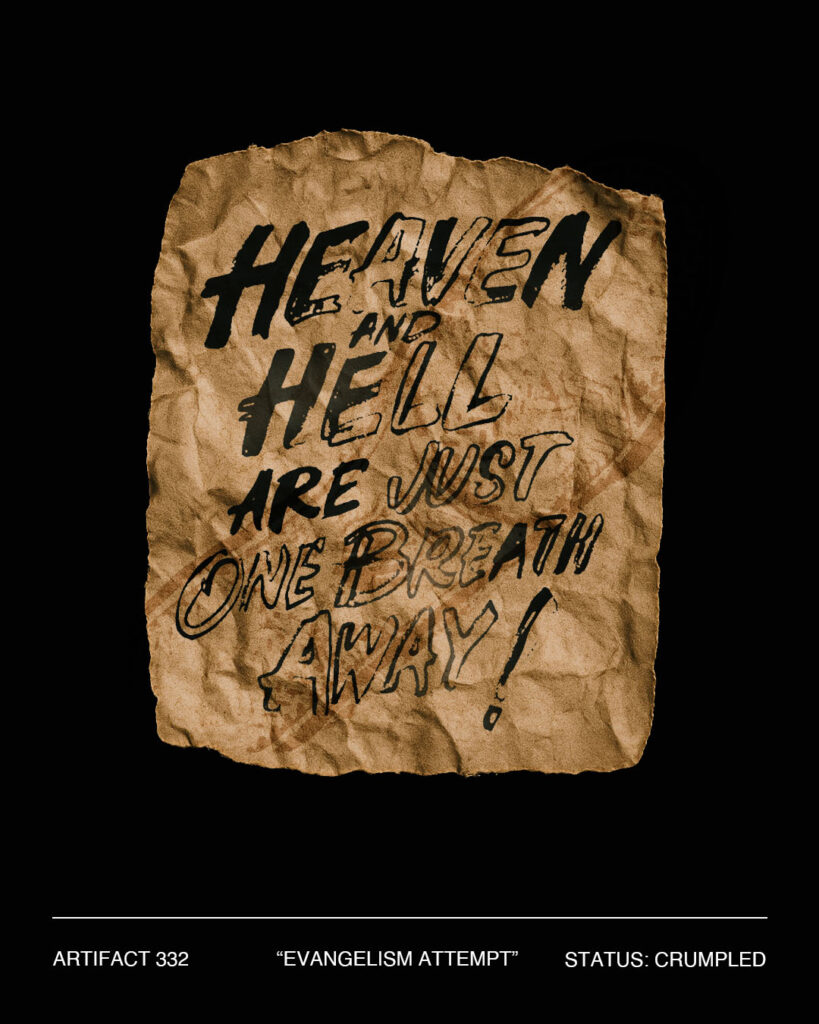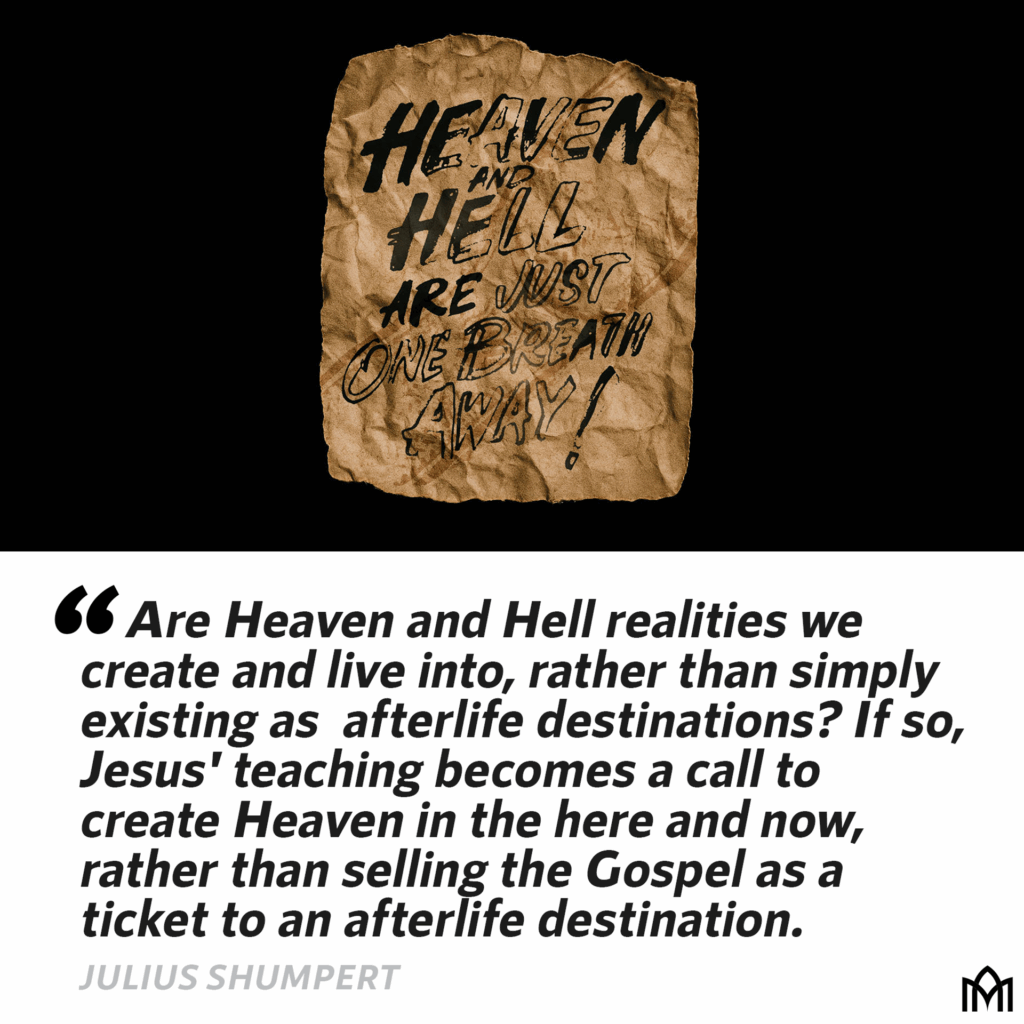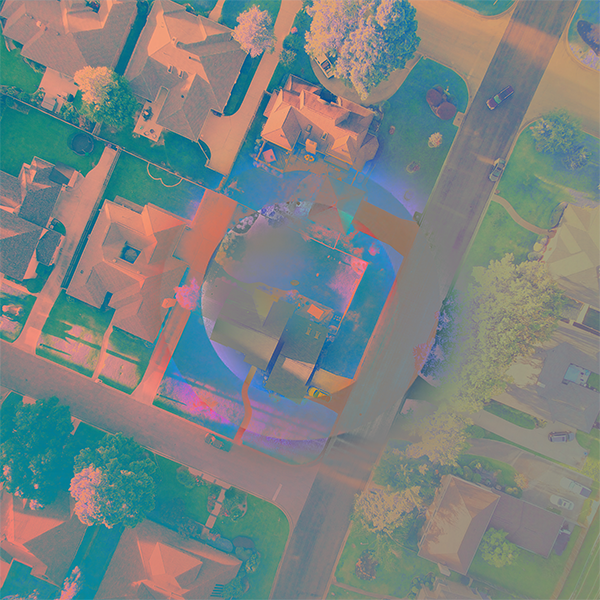Saved?: Where Will You Go?
“Are you ok, Ju?”
My dad stood at the door of my dark bedroom, the only light coming from the hallway. He looked down at me curled in a ball on the carpet, zipped up in my tattered cream hoodie; the same one I clung to as a security blanket those last couple of years of High School. I murmured a swift “I’m fine,” which really translated to “Go away,” which seemed to be received well enough by my concerned father. As the door closed, tears flowed from my face as I wrestled with all the theology I had been steeped in up until that point. I was going to Hell.
God had made it impossible for me to be saved, especially as “saved” was defined at every Assemblies of God youth conference we attended. It didn’t matter how much I enthusiastically served our church, or fervently prayed, or deeply studied the Bible. I had starved myself and self-flagellated, but for what? At the end of my days, I was doomed for Hell because I was a boy who had crushes on other boys; a desire I didn’t want or ask for.
Salvation has always been at the core of my experience of the Christian faith. This communal concern with the afterlife consumed everything the community did and discussed. Since death is an unavoidable reality, the goal of heaven became our escape from its power. If you believe in Jesus, then you will spend eternity with Him in heaven. But if you didn’t believe or had never heard about Jesus, you would be tortured in hell for all eternity. (At times, this felt like a cosmic gun to my head.) This evolved into the idea of being “saved,” which is derived from Romans 10:9.
However, is this view of salvation helpful? Does the traditional understanding of heaven and hell produce Christ-like individuals? Or does it contribute to an unhealthy hierarchy within the Church that is more concerned with perception over purpose?
Let’s talk about hell for a moment. The number one thing that I have heard from all my friends who have left the Church is that the inherited fear of hell was one of the most significant traumas they continue to struggle with. Perhaps for newer Gen Z followers of Christ, sermons have largely omitted hell as a main topic. However, for those raised in the 2010s and earlier, the question “If you died today, where would you go?” evokes a world of baggage.
Besides the trauma I have seen the traditional view of Hell cause for some, my central reservation is ultimately what it says about God and the Gospel. It is almost as if you are trading a fear of Death for a different type of fear. Share on X

© Julius Shumpert (@cosmicchrist_ and @saintjuliusart on Instagram).
Hell usually appears in the Bible as translated from one of the following terms: “Sheol,” “Tartarus,” “Hades,” or “Gehenna.” Throughout the Old Testament, the concept of Sheol is referenced several times (See Psalm 139:8 and Isaiah 14:9 as two examples). Sheol is not a place of torment or damnation, but rather a general realm for the dead. Most early cultures and civilizations around the Mediterranean held the idea of a general underworld where the soul descended at death. This is similar to the Greek and Roman concept of Hades. Tartarus is also a Greek concept, but it functions somewhat differently. In Greek mythology, it is believed to be an abyss in Hades where the Titans were kept and tortured. 2 Peter 2:4 uses this imagery to discuss fallen angels as mentioned in the extra-biblical book of Enoch (Enoch 20:2).
In the New Testament, Jesus often uses the term “Gehenna” (also spelled “Gehinnom”). Gehenna is a valley outside Jerusalem where pagan worshippers of the Ammonite god Molech would sacrifice children. Massive fires played a significant role in these ceremonies. Later, after the return from Exile, this valley was turned into a garbage dump to prohibit sacrifices and bury the defiled grounds.
Jesus tells two specific parables where these words are mentioned and highlighted. In Matthew 25:31-46, Jesus teaches a parable about the separation of goats from sheep at the end of time. Hospitality was of extreme importance in ancient Jewish culture. In this parable, Jesus (the King) says that those who follow him but are not hospitable during their lives will be punished by “the devil and his angels” (Matthew 25:41). This form of teaching was common among Rabbis at the time. The heightened language gave the audience a sense of urgency to act and a broader cosmic framework to place morals within.
In Luke 16:19-31, Jesus tells another parable about a rich man and Lazarus. The rich man indulges in all of life’s pleasures, but ignores the extreme poverty experienced by Lazarus. At the end of the parable, Lazarus is carried to Abraham’s side, and the rich man is thrown into Hades. Note that the author, Luke, is Greek, and borrows the concept of Hades to convey Jesus’ parable. This is similar to the use of the Valley of Gehenna as an illustration in the previous parable. The city of Jerusalem was built on hills that had high elevation. The Temple was the highest point of the city, where the faithful ascended into God’s presence. Gehenna was low and associated with idol worship, garbage, and darkness. In other words, both stories show Jesus posing a question to his audience that uses this geographical location as a contextual teaching tool. Jesus’ emphasis was not “Where will you go when you die?” but rather “Will you take life’s opportunity and be a conduit for God’s goodness to those around you?”
Where humanity has made the point of the message about what happens in the end, Jesus is saying to take advantage of the present moment.
So, does the traditional understanding of Heaven and Hell produce Christ-like individuals?
Jesus asks provocative and surprising questions about eternity. Not, 'Where will you go when you die?' But, 'Will you take life's opportunity and be a conduit for God's goodness to those around you?' Share on X
Reflecting on my own story and the stories of so many in my life, it’s unclear. Many individuals who have blessed me and with whom I live life with still hold onto the traditional understanding of hell that I now disagree with. And yet these people are Christ-like in their display of God’s love and strive to make room for everyone. It appears that they are not driven by their understanding of hell, but the hope that heaven offers.
Besides the trauma I have seen the traditional view of hell cause for some, my central reservation is ultimately what it says about God and the Gospel. It is almost as if you are trading a fear of death for a different type of fear. When I read Hebrews 2:9-15, I see how the writer describes how Jesus entered into death to take the power away from death, which is fear. Why would we then use the very tactic that Jesus came to free us from to create disciples?
There are many different ways of interpreting what Hell is. However, one functional way that has helped me comes from Carlton Pearson. Carlton Pearson was a controversial figure in 1990s American Christianity. He was the pastor of one of the largest churches in Tulsa, Oklahoma, at the time. He was famous for his Pentecostal preaching and singing about getting saved and avoiding hell. But one evening in 1994, after watching the genocide happening in Rwanda on television, he came to a crossroads. Carlton later attested that he asked God why all these people suffering unjustly were going to be sent to hell as they died. Carlton claimed that he heard God tell him that hell is created on earth by human depravity and behavior.
Carlton Pearson’s reasoning makes sense to me during my ongoing deliberations on the topic, especially in light of passages like 1 Corinthians 6:9-10. This passage is usually taken out of context and used to condemn the LGBTQ+ community, but it is actually about something completely different and more universal. In combination with Jesus’ pronouncement that the Kingdom of God lives within you (Luke 17:21), this passage shows us that selfish and harmful behavior hinders you from entering into the image of the kingdom you are called to embody. It is what Thomas Merton calls your “false self.” If we, as Christians, can create glimpses of heaven through our service, compassion, and mercy, then isn’t the opposite also true? Isn’t it by our ego, judgment, and malice that we create the reality of hell? If hell is thought to be the absence of God’s presence (which I believe to be an impossibility), then the lack of God’s attributes experienced anywhere would fit that description.
This has led me to think of heaven and hell as realities we create and live into, rather than simply as afterlife destinations. Jesus’ parables, then, become a call to create heaven in the here and now, rather than selling the gospel as a ticket to an afterlife destination. If we truly believed this collectively as a worldwide Church, we would see the genocide currently happening in Gaza as evidence of Hell manifesting itself on earth. It would move us with holy unction and divine obligation to fight until “the gates of Hell can no longer stand” (Matthew 16:18).

© Julius Shumpert (@cosmicchrist_ and @saintjuliusart on Instagram).
Years after my dad found me depressed on my bedroom floor, I sat in the back row of a church I began attending in college. It was a big church not far from my college campus, but I found a home there. This particular service was our 15th anniversary, and tangible excitement filled the room. The worship band played, and everyone sang with all the strength they had. At the end of the worship set, Pastor came up and read Romans 10:9:“If you declare with your mouth, ‘Jesus is Lord,’ and believe in your heart that God raised him from the dead, you will be saved.” In that moment, I heard that same verse from my childhood transform within me: What I confess with my mouth is a reflection of what is inside my heart. With everything in me that day, I strived to express the truth of Jesus’s Lordship. It was He who was in control, not me.
This confessional truth flowed from my heart as one simple fact: Death has no power; there was something greater. Life was worth living now because the end wasn’t something to fear. It was in that moment that I realized that “saved” wasn’t something you strived for, it was something that was flowed from within you as the Spirit made my heart God’s home.
///
If we, as Christians, can create glimpses of Heaven through our service, compassion, and mercy, then isn't the opposite also true? Isn't it by our ego, judgment, and malice that we create the reality of Hell? (1/2) Share on X
If Hell is thought to be the absence of God's presence (which I believe to be an impossibility), then the lack of God's attributes experienced anywhere would fit that description. (2/2) Share on X




